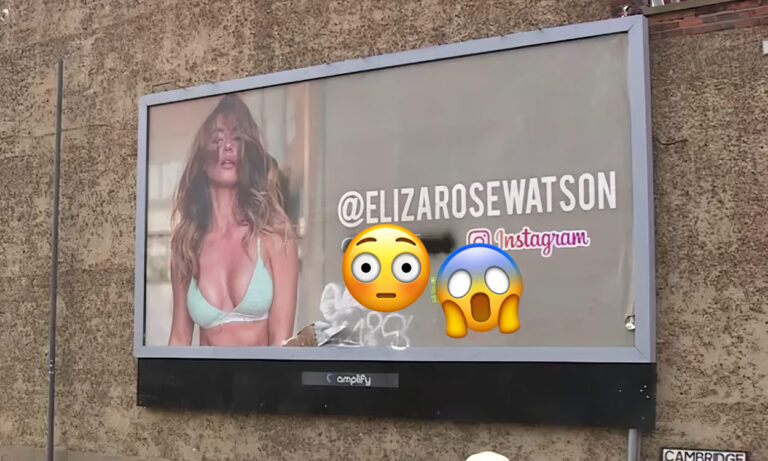Controversial billboard promoting OnlyFans model is met with local outrage

It’s pretty commonplace to spot countless adverts serving as daily eyesores during our commutes. What’s not that common is seeing an advert that has the ability to spark an inordinate amount of discourse and anger from locals. The ad in question? A poster promoting the model Eliza Rose Watson’s Instagram account and OnlyFans account.
The four billboards that appeared around Harrow and Edgware in North-West London and Lambeth in South-West London, show the model dressed in underwear with her socials tag plastered above, alongside logos for the subscription service…
The racy subject on the poster aside, the main criticism of the billboards, in particular from locals, was the inclusion and reference to OnlyFans, the infamous subscription-based platform where content creators can lock photos and posts behind a paywall for dedicated fans.
You’d have to have been living under a rock to not know that OnlyFans has become a hub for e-girls, models, and sex workers to sell explicit photos of themselves online—a concept which I just want to make clear is perfectly legal and legitimate. The popularity of OnlyFans is unprecedented, with the platform hosting a slew of famous content creators such as Trisha Paytas, and Twitch streamer Amouranth.
The storm that this website created managed to bring the conversation of digital sex work to the surface of social media and while the site rightfully became a point of concern for parents and educators trying to help young people navigate online spaces responsibly, it has also been a target for misogynists, individuals who’re angry at the thought of women expressing themselves, while also making a pretty penny off of men online.
Talking to the BBC, locals from Harrow expressed that their concern with the advert lay in the fact that it promotes soft pornographic content, albeit with nothing overly explicit shown the ad itself outside of an inclusion of the OnlyFans logo. Concerned local, Alex Mitchell said he has no problem with people following a career path but that “you’ve got a primary school up the end of this road, you’ve got a secondary school there—young people are impressionable, and it’s completely out of order.”
The BBC also had the opportunity to Watson herself, who is at the centre of the controversy. She told them that: “ I would say it’s no more adult than an ad for alcohol and, actually, less racy even than ads you see for lingerie within big shopping centres.”
The content creator went on to suggest that if children were recognising the logo then it was a “wider issue” that needs to be addressed, separate from her right to advertise.
While the billboard agency claims no rules were broken by Watson’s ad, it stands as a reminder that the safety of children should be prioritised above all else, especially when the question of digital safety is brought into the fold, however the conversation needs to remain free from misogynistic rhetoric against women trying to make a legitimate living online.




